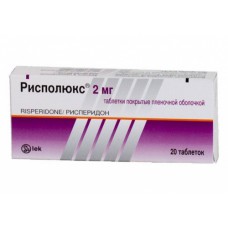Expiration date: 10/2025
Structure and Composition:
Tablets, film-coated. One tablet contains active substance:
risperidone 1, 2, 3 or 4 mg
Excipients: lactose monohydrate, pregelatinized starch, MCC, croscarmellose sodium, sodium lauryl sulfate, colloidal anhydrous silica, magnesium stearate
shell:
tablets, film-coated, 1 mg: Opadry White Y-1-7000 (hypromellose 5 cP (62.5%) of titanium dioxide E171 (31.25%) and macrogol (6.25%)
tablets, film-coated, 2 mg: Opadry pink 03B 54942 (hypromellose 6 cP (63.65%), titanium dioxide E171 (29.477%), macrogol 400 (6.3%), iron (III) oxide red (E172) (0.573% )
tablets, film-coated, 3 mg: Opadry Yellow 03V 52852 (hypromellose 5 cP (62.5%) of titanium dioxide E171 (28.75%), macrogol 400 (6.25%), quinoline yellow aluminum lake (2.5%)
tablets, film-coated, 4 mg: Opadry pink 20A 54901 (giproloza (40%) hypromellose 6 cP (40%) dioxide E171 Titanium (19.285%), iron (III) Red E Oxide 172 (0.645%), iron (III) oxide E172 black (0.07%)
in blister 10 pcs. a stack of cardboard 2, 5, 6 or 10 blisters (for a dosage of 1 or 2 mg) and 2, 5, 6 blisters (for a 3 or 4 dose mg).
Characteristic:
Neuroleptic, benzisoxazole derivative.
Pharmacokinetics:
Risperidone after oral completely absorbed, reaching Cmax plasma within 1-2 hours. Food intake does not affect the completeness and speed of absorption.
Metabolism carried out by cytochrome P450 CYP2D6 to form a 9-hydroxyrisperidone, whose pharmacological activity comparable to the activity of risperidone. Risperidone and 9-hydroxyrisperidone represent the so-called neuroleptic fraction. Risperidone is also subject to the N-dealkylation.
T1 / 2 is about 24 hours for 9-hydroxyrisperidone, and neuroleptic fraction in general.
At intake 70% of the risperidone dose excreted by the kidneys (35-45% in the form of the pharmacologically active fraction), 14% - with bile.
The plasma clearance after oral administration is 1.667 ml / s.
Stable concentration of risperidone in the blood of most patients are achieved within the first days of treatment, 9-hydroxyrisperidone - 4-5 th day. Risperidone plasma concentrations are proportional to the dose of the drug (in the range of therapeutic doses).
In elderly patients and in patients with renal insufficiency, drug concentration in the plasma increases, and the half-life - increases. Risperidone plasma concentrations in patients with hepatic failure are not changed.
Description of the pharmacological actions:
Antipsychotics, also has a sedative, antiemetic and hypothermic effect.
Selective monoaminergic antagonist that has a high affinity for serotonergic 5-NT2- and the D2-dopaminergic receptors, also binds to alpha1-adrenergic receptors and slightly weaker H1-histaminergic and alpha2-adrenergic receptors. It has no affinity for cholinergic receptors.
Risperidone is particularly effective in the treatment of schizophrenia with positive symptoms (delusions, hallucinations, aggressiveness), also has a positive effect on negative symptoms.
Balanced central antagonism of serotonin and dopamine may reduce the propensity for extrapyramidal side effects and enhance the therapeutic effects of the drug, covering the negative and affective symptoms of schizophrenia. It causes minimal suppression of motor activity and to a lesser extent induces catalepsy than classic antipsychotics neuroleptics.
Indications:
- Schizophrenia (mild exacerbations, supportive therapy) and other psychotic disorders with a predominance of productive and / or negative symptoms
- bipolar disorder with mania
- affective disorders in a variety of mental illnesses
- behavioral disturbances in patients with dementia with symptoms manifestation of aggressiveness, activity disturbances (agitation, delirium) or psychotic symptoms
- behavioral disorders in patients with reduced intellectual level or mental retardation, including as a means of adjuvant therapy for mood stabilization.
Contraindications:
- Hypersensitivity to risperidone or any other components of the drug
- lactation.
Carefully:
- Severe renal and / or hepatic impairment
- cardiovascular disease (chronic heart failure, myocardial infarction, AV block)
- hypovolemia
- conditions that predispose to the development of tachycardia type "pirouette" (bradycardia, electrolyte imbalance, concomitant administration of drugs prolonging the QT interval)
- Parkinson's disease
- cerebrovascular accident
- Reye's syndrome
- epilepsy, convulsions in history
- brain tumor
- Acute overdose of drugs, drug dependency
- dysphagia
- ileus
- Children up to age 15 years (application experience is limited)
- pregnancy.
Application of pregnancy and breastfeeding:
The use of risperidone during pregnancy is possible only if the expected benefit to the mother outweighs the potential risk to the fetus.
The drug is released in breast milk, so while taking the drug need to stop breastfeeding.
Side effect:
Allergic reactions: skin rash, rhinitis, pruritus, angioedema, anaphylactic shock,
From the CCC: orthostatic hypotension, reflex tachycardia, hypertension, sinus bradycardia, AV block, 1 st degree, atrial fibrillation, syncope, peripheral edema.
On the part of the digestive tract: dry mouth, nausea, vomiting, dyskinesia, dyspepsia, anorexia, abdominal pain, constipation, hypo-or hypersalivation, jaundice, dysphagia, gastritis, pancreatitis.
From the nervous system: insomnia, headache, dizziness, agitation, anxiety, drowsiness, fatigue, decreased ability to concentrate, convulsions rarely - extrapyramidal disorders (tremor, rigidity, hypersalivation, bradykinesia, akathisia, acute dystonia), incoordination, violation speech hyposensitivities, sleep disorders cerebrovascular accident (in elderly patients with predisposing factors).
In patients with schizophrenia: tardive dyskinesia (involuntary movements of the tongue, and facial muscle contractions), neuroleptic malignant syndrome (hyperthermia, extreme muscle rigidity, altered mental status, autonomic dysfunction, increased creatine kinase activity, tachypnea), seizures.
With the genitourinary system: priapism, erectile dysfunction, anorgasmia, urinary incontinence, abnormal ejaculation.
From endocrine system: galactorrhea, gynaecomastia, menstrual disorders, hyperglycemia, hyperprolactinemia, violation of production of antidiuretic hormone.
Laboratory findings: neutropenia, thrombocytopenia, anemia, granulocytopenia, agranulocytosis, the increase in ALT levels, eosinophilia, leukopenia, increased levels of AST.
Other: dry skin, hyperpigmentation, photosensitivity, hyperkeratosis, increased sweating, weight gain, arthralgia, myalgia, visual disturbances, mania, nasal congestion, epistaxis, sleep apnea, in elderly patients with dementia increased susceptibility to infections, polydipsia.
Drug Interactions:
Antacids reduce the absorption of oral antipsychotics.
Risperidone reduces the effectiveness of levodopa or other dopamine agonists.
Antihypertensive drugs increase the severity of blood pressure lowering in patients receiving risperidone.
Phenothiazine antipsychotics, tricyclic antidepressants and some beta-blockers, while the appointment with risperidone may increase its concentration in blood plasma without affecting the concentration of the antipsychotic fraction.
Carbamazepine and other hepatic enzyme inducers decrease the concentration of the active fraction of risperidone in plasma.
At the same time taking fluoxetine risperidone increased plasma concentration, but the level of antipsychotic fraction increases slightly.
Antipsychotics increase the effect of alcohol, antihistamines, benzodiazepines and other drugs which depress the central nervous system.
Dosage and administration:
Inside, regardless of meals, drinking water.
Adults and children over 15 years.
Rispolux initial dose for all patients (with acute manifestations of the disease and the chronic course) - on the second day of the 2 mg / day (1 or 2 doses) - up to 4 mg / day dose may continue, if necessary, be increased or reduced by 1-2 mg weekly intervals. Doses above 10 mg / day did not show a higher efficiency compared to lower doses and may cause the appearance of extrapyramidal symptoms. The maximum daily dose - 16 mg.
In the case of the need to achieve sedation together with Rispolux can be administered benzodiazepines.
Renal and / or hepatic impairment and patients older age group. Rispolux recommended starting dose of 0.5 mg 2 times a day. This dose can be gradually (0.5 mg) was increased to 1.2 mg per reception 2 times per day.
When you go to treatment Rispolux recommended phasing out previously hosted neuroleptic. If you previously used antipsychotic depot for parenteral administration, the first dose should be taken instead Rispolux injection in accordance with the mode of administration of antipsychotic depot.
Overdose:
Symptoms: drowsiness, sedation, tachycardia, hypotension, extrapyramidal symptoms, rarely - lengthening the interval QT.
Treatment: acute overdose should ensure a free airway to ensure adequate oxygen supply and ventilation, ECG monitoring, gastric lavage, the appointment of activated charcoal and laxatives, symptomatic therapy aimed at maintaining vital functions in the development of extrapyramidal symptoms - the appointment of anticholinergic drugs. Constant medical supervision should be continued until the complete disappearance of symptoms of intoxication. No specific antidote.
Special instructions:
Due to the fact that the reception Rispolux can lead to weight gain, the patient should make recommendations on diet.
In the event of orthostatic hypotension, especially at the beginning of treatment, you should consider lowering the dose. In patients with diseases of the cardiovascular system, as well as dehydration, hypovolemia, or cerebrovascular disorders the dose should be increased gradually.
In case of cancellation of carbamazepine and other hepatic enzyme inducers Rispolux dose should be reduced.
If symptoms of tardive dyskinesia or neuroleptic malignant syndrome should consider the cancellation of all antipsychotic drugs, including Rispolux.
It recommended a gradual withdrawal of the drug, since after abrupt discontinuation of treatment with high doses of neuroleptics may develop withdrawal symptoms (nausea, vomiting, sweating, insomnia).
Effects on ability to drive vehicles and operate machinery. During treatment with risperidone should be careful when driving and occupation of other potentially hazardous activities that require increased attention and psychomotor speed reactions.



